Research skills are a vital component to the success of any scientific research and development project. These skills are all the more important for young researchers in developing countries due to their limited resources, learning opportunities, and access to international academic/scientific standards. If the skills are improved, it will help improve the effectiveness and sustainability of development projects and scientific research projects. Realizing this problem, the key research group of Market Linkage, and Development (Department of Quantitative Analysis), under the Faculty of Economics and Rural Development, Vietnam National University of Agriculture in collaboration with the University of Tasmania (UTAS), Australia has designed and developed a training program on research skills for early and mid-career researchers in agricultural development projects in Vietnam and Laos with the sponsorship of the Australian Center for International Agricultural Research (ACIAR).
Research skills in the training program have been focused on in five modules:
1) Project development: How to develop a research proposal (project)
2️ ) Team management: How to work with project team members
3️ ) Project Management: How to manage a research project
4️ ) Research communication: Project report and scientific writing
5️ ) Research career development: What should be done in the future.
The training program was originally designed to be 7 days, but due to the impact of the Covid-19 epidemic, it was divided into two parts. Part 1 of the training was held for 3 days online from June 29th to July 1st, 2020, in which theoretical framework of research proposal development was given to participants. Part 2 of the training program after a long delay due to the Covid-19 epidemic was held at Vietnam National University of Agriculture in persons from November 16th to 20th, 2022, of which two-day field trip included.
There are 30 members from different universities and research institutions from Vietnam and Laos participated in the training. Institutions of Vietnam included Vietnam National University of Agriculture (VNUA), Thai Nguyen University of Agriculture and Forestry (TUAF), the Fruit and Vegetable Research Institute (FAVRI), the Vietnamese Academy of Forestry Sciences (VAFS), the Research Institute for Aquaculture No 1 (RIA1), the National Institute of Animal Sciences (NIAS) and a NGO in Vietnam, the International Livestock Research Institute (ILRI). From Laos, five participants from the National University of Laos (NUOL), and the National Agriculture and Forestry Research Institute have participated in the training workshop.
    |
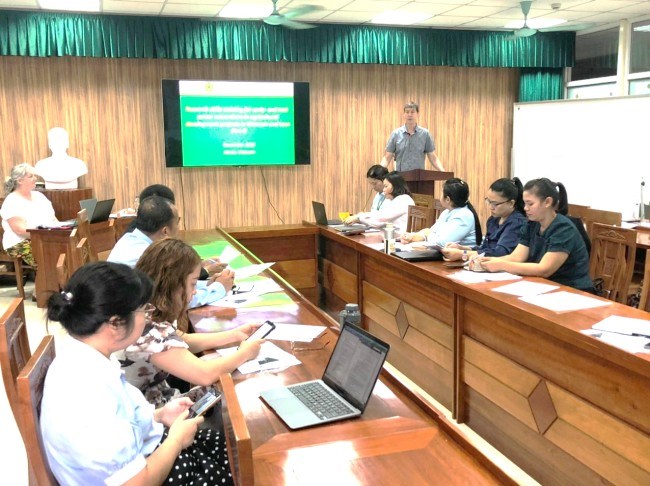 |
| Dr. Stephen Ives presented at the training session |
During 02 days of training in persons at Vietnam National University of Agriculture, experts from the University of Tasmania (Australia) and Vietnam National University of Agriculture systematized the knowledge of the theory of change that had been trained in the online training sessions. Specifically, in order to be able to formulate a project proposal based on the theory of change, five steps can be carried out from the formulation and determination of the desired change to the concretization of the theory of change, to a general consensus on theory of change among stakeholders, building project logic and project impact.
    |
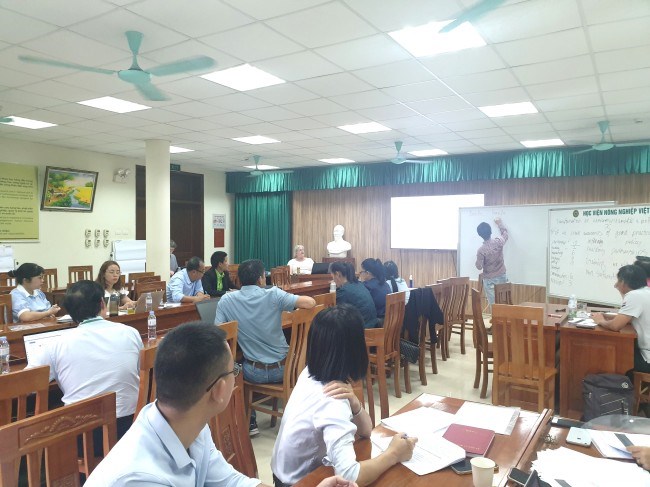 |
| Dr. Duong Nam Ha (VNUA) presented at the training session |
During their studies, young researchers are divided into small groups so that they can practice the steps of building projects based on the theory of change for their projects and research presently. From there, the training knowledge is applied in practice to improve the efficiency of knowledge acquisition. In addtion, during the training period at the Vietnam National University of Agriculture, the group of trainees had the opportunity to visit and learn from research approaches from institutes and centers affiliated with the University, including the Center for Tropical Bee Research and Beekeeping, the Institute for Microalgae and Pharmacosmetics, VECO Education Ecology Center Center (VNUA) and the Center for Flowers Ornamental Research And Development (FAVRI). This is not only an opportunity for young researchers to access research models and its applications but also a chance for participants and ressearchers to expand their research network and form research ideas for future multidisciplinary research. At the end of 2 days of training at the Vietnam National University of Agriculture, the participants presented their work to receive suggestions from experts for improvements.
    |
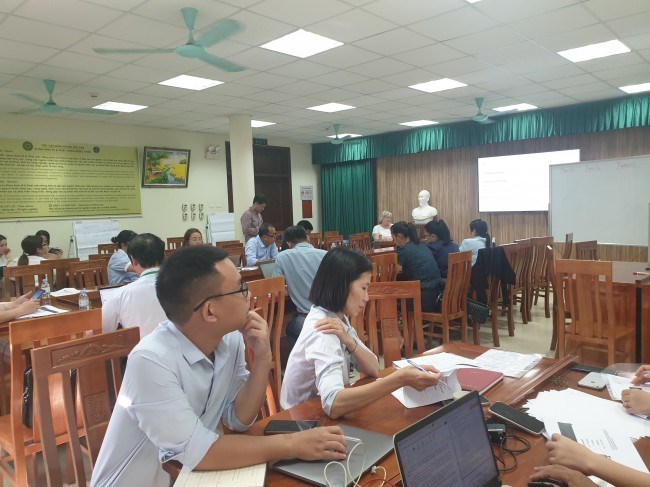 |
| Groups exchange research ideas at the training session |
Then, in two-day filed trip in Cat Ba island, the group visited the National Broodstock Center for Mariculture Species in Northern Vietnam, under the Research Institute for Aquaculture No 1. With a scale of nearly 22 hectares, the nursery model breeding hybrid grouper and ocean oysters at the Center is constantly providing high-quality seed for local and foreign fishing grounds. Not only the young research team was excited of the research findings at the Center, the expert from the University of Tasmania also expressed surprise when they first saw the use of oyster shells as a medium for raising oysters, they evaluate this as one of the more environmentally friendly methods than using plastic substrates like in Australia. In addition, the Center also has enough areas for raising broodstock off the coast of Lan Ha Bay with countless fish strains such as: grouper, yellowfin pompano, cobia...
    |
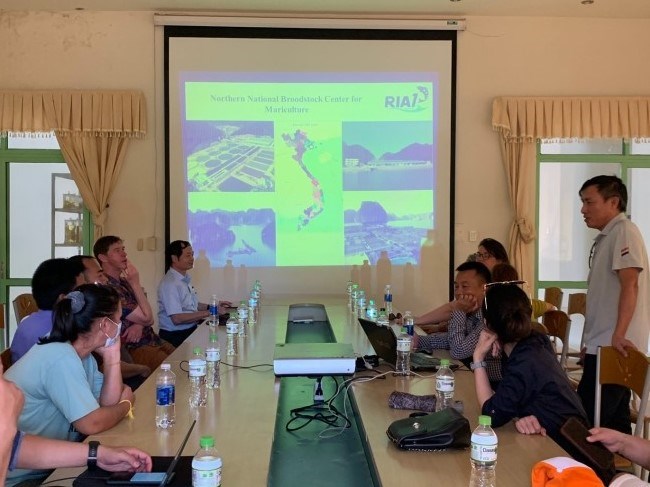 |
| Dr. Cao Truong Giang presented an overview of the activities of the National Broodstock Center for Mariculture Species in Northern Vietnam and related projects sponsored by ACIAR |
    |
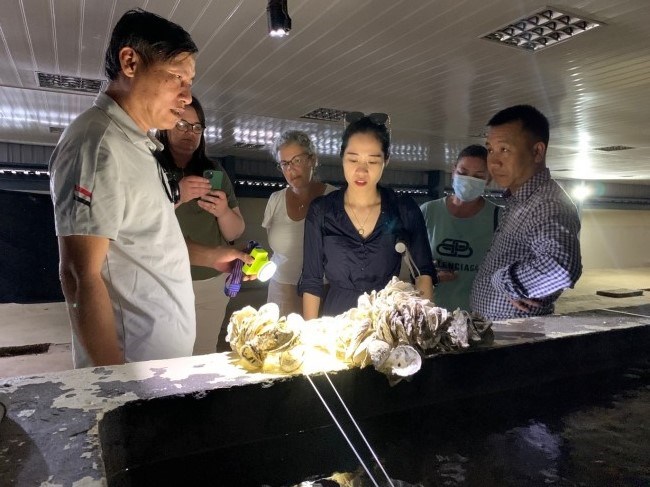 |
| Mr. Cao Truong Giang introduced the oyster nursery model at the Center |
    |
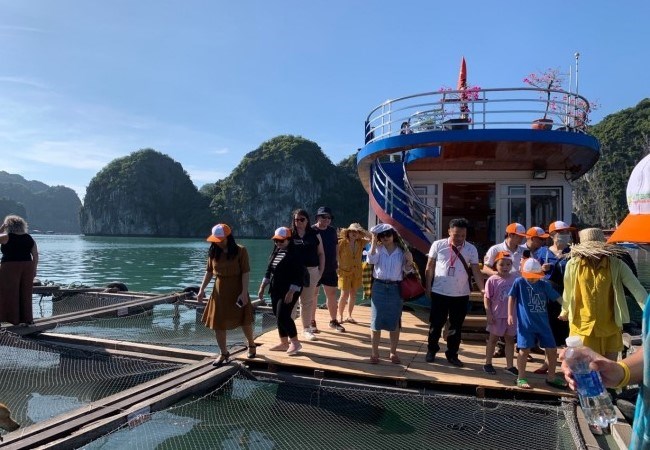 |
| The delegation visited the broodstock rearing raft of The National Broodstock Center for Mariculture Species in Northern Vietnam on Cat Ba island |
    |
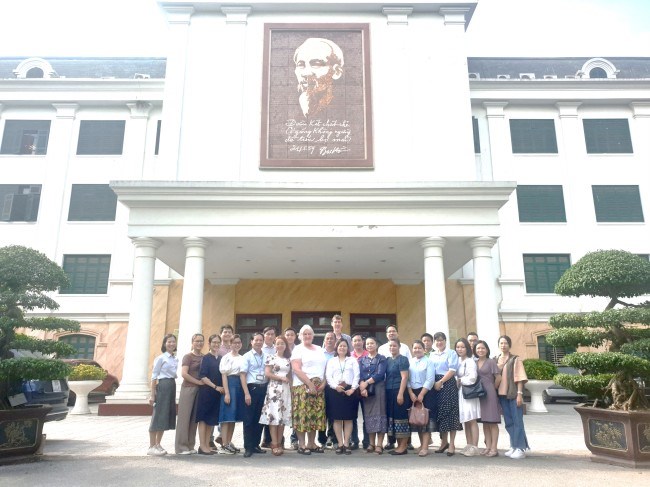 |
| The members participated in the training to take souvenir photos at the Vietnam Academy of Agriculture |
Ninh Xuan Trung, Do Huy Hung, Duong Nam Ha, Pham Van Hung
Key Research members of Economic Linking and Market Development Group